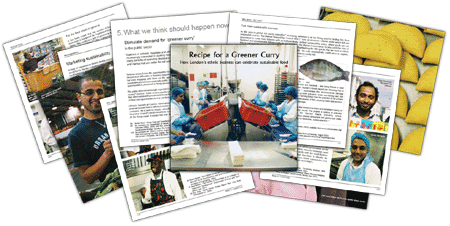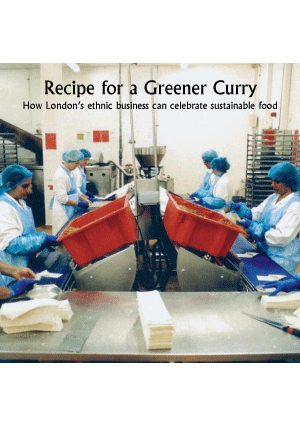Recipe for a Greener Curry: How London's ethnic business can celebrate sustainable food
 Black, Asian and Minority Ethnic (BAME) businesses are vital for the cultural and economic vibrancy food in London, and Britain. Yet this ground-breaking report shows that, like the rest of the food sector, many businesses have not yet grasped the market opportunities presented by our growing appetite for sustainable food.
Black, Asian and Minority Ethnic (BAME) businesses are vital for the cultural and economic vibrancy food in London, and Britain. Yet this ground-breaking report shows that, like the rest of the food sector, many businesses have not yet grasped the market opportunities presented by our growing appetite for sustainable food.
It has become a modern cliché to say that ‘green’ is the new black. Sustainability is, at last, fashionable and the UK market for ethical food - for example organic, fair trade and local - has now reached at least £2 billion. This report explores how much "black" has embraced "green".
Black, Asian and Minority Ethnic (BAME) businesses make a major contribution to the cultural vibrancy of British food, with the market for "ethnic" food generating some £1.29 billion in 2004, and still rising. Yet this
London Food Link (LFL) report shows that many of these businesses - as in the rest of the food sector - have not yet grasped the market opportunities presented by our growing appetite for sustainable food.
In this under-researched area, London Food Link undertook face-to-face and telephone interviews with BAME owners of micro, small and medium-sized enterprises (SMEs) across the food sector - from farmers to caterers - and also approached people at a range of public and trade events. We now have a vivid snapshot of:
- the potential for integrating more sustainable food into culturally distinctive businesses; the barriers that might be inhibiting these positive developments; and
- what more could be done to speed up sustainability in this part of the food industry.
This 128-page report recommends that Government provides both money and a higher profile for measures to stimulate the supply of sustainable food from small and medium-sized enterprises (SMEs) as well as the demand for sustainable food, including from schools, hospitals and other public sector caterers. As well as calling for Government action, Recipe for a Greener Curry gives well-deserved publicity to the current “green” entrepreneurs in the BAME food sector, and also aims to inspire others to build on their achievements, finding new and exciting ways of bringing culturally distinctive, delicious and sustainable food to our plates.
The report was researched and written by Sustain project officer Zeenat Anjari, supported by London Food Link colleagues
Report contents
Foreword
- Sir Gulam Noon
- Murad Qureshi AM
Summary and recommendations
1. Introduction
- Why produce this report?
- Sustain's London Food Link project
2. Why ‘green’, why ‘curry’?
-
‘Green’
- What we mean by sustainable food and farming, and why it is important
- The growing market for sustainable food
- Government policies to support sustainable food and farming
-
‘Curry’
- What we mean by ethnic food
- The importance of ethnic food
- Government policies to support small and medium-sized enterprises, and black and ethnic minority businesses
3. What we did
- Literature search
-
Interviews
- Individual businesses
- Events
- Limitations
4. What we found
-
Problems
- Lack of knowledge about and skills for implementing sustainable business practices
- Higher cost of sustainable food, and lack of money to invest in change
- Inappropriate help available
- Lack of suppliers of suitable sustainable food
- Inadequate supply infrastructure
- Uncertain demand for ‘greener’ curry
-
Opportunities
- Small is beautiful
- Some specialist infrastructure still exists
- Some practical support is already available
- Sustainability is already part of many cultures
5. What we think should happen now
-
Stimulate demand for 'greener curry'
- In the public sector
- Reinvesting money in the community
- In black and ethnic minority communities
- In the market in general
- Support sustainable food suppliers
-
Invest in infrastructure
- Joined-up accreditation
- Marketing
- Distribution
- Provide tailored business support
6. Recommendations
- Marketing sustainability
- Support services for ethnic food businesses
- Support from national and local authorities
- London Sustainable Food Hubs
- Development of standards
- And finally…
Case studies
- By Chaat House
- Bronek's Deli
- Caterers International Ltd
- FudCo Quality Products
- Gazebo Fine Foods
- The London Tea Company
- M&R Superfresh
- NamaYasai
- Oasis Catering
- Organic India
- Port Royal Patties
- Ummah Foods Ltd
- Willowbrook Farm
- Winner Foods
Appendices
- Faith and ecology
- Where to get more help
- Contact details of case studies
Acknowledgements

Recipe for a Greener Curry: How London's ethnic business can celebrate sustainable food
ISBN: 1-903060-42-7 128pp - 2007 | 2527Kb
Published Saturday 31 March 2007
London Food Link: London Food Link brings together community food enterprises and projects that are working to make good food accessible to everyone in London to help create a healthy, sustainable and ethical food system for all.